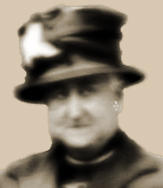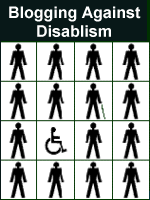We've all met them. Or rather, if you haven't met at least
one of them, then you're living a charmed life. Either that or you're spending your days in splendid isolation from the common herd in the manner of Simeon Stylites. Or possibly David Blaine. But I digress. It's the meds. Honest. Would I lie to you?
Anyway, yes. Them. The people who have done everything you've ever done, been everywhere you've ever been, and who have had every medical condition you've ever had. Only they've had it
worse. They
know what you're talking about. They
understand.
I used to work with one of them. The rest of us used to take it in turns to come up with increasingly unlikely pastimes to see whether he would admit failure. But no. If he hadn't done it/been there/experienced that himself, he had a mate who had. And who had told him
all about it. As it happens, he was an absolutely delightful chap and, try as you might, you really couldn't hold it against him. If only they were
all like that...
But they're not. And when you've got serious health problems, these are the people you want to avoid like the plague. If only because the impulse to grab them by the scruff of the neck and pound their head into a brick wall can be
very difficult to resist.
Let me give you an example.
I have a friend whose husband had a sub-arachnoid haematoma nearly twenty years ago when they were on holiday in Greece. Large portions of his brain were destroyed with the result that he has severe short-term memory problems. He is
unbelievably difficult to live with and care for, and she is the closest I have ever met to a saint.
He can't read books because he can't hold the plot in his head. The only television programmes he can watch are the ones where they helpfully remind you what just happened every five minutes or so. In other words, the ones which anyone with even a modicum of intelligence strenuously avoids. He can't cook even a simple meal on his own because he can't remember where he's up to and what he did last. Despite being on a very low income, they have to eat convenience foods: if he sees my friend cooking, he becomes very frustrated if he can't join in. When he's driving her to distraction, she sometimes sends him out to do something straightforward like sweeping the path. Once started, he has no idea how long he's been out there. So he'll sweep for two hours, left to his own devices. In fact, he'll repeat any task for long enough to injure himself if he's left to his own devices.
But that's not the worst of it. Because he can't remember people's responses to the way in which he behaves, he has never re-learned to take other people's feelings into account. So, emotionally, he's like a toddler. One which is six foot tall and very strong. He throws tantrums and has towering rages. Which he forgets as soon as they're over. Imagine the frustration: you've had an enormous row with your other half; you're still seething with resentment; and he genuinely doesn't know why you're being so grouchy with him because he's already forgotten that you fell out. She doesn't even have the luxury of stewing in her own juices, because she can't leave him unattended. Over the years, they have lost all but one of the friends they had made as a couple before this happened: his amnesia makes him, in all honesty, intolerable company.
But, because it's his
memory which has been affected rather than his
intelligence, if you only met him for five minutes, you would have no idea that he has any kind of impairment, let alone one with such a devastating impact. So my friend often finds herself having to explain his difficulties to people. Which is ok, unless the person you're explaining them to is one of
them.
"Oh, I know what you mean!", they say. "My memory's not what it was. I'm getting quite forgetful. Why, only the other day I [insert anecdote of choice referring to non-critical senior moment] ."
In other words, "Have you stopped speaking now? Oh
good. I couldn't really concentrate on what you were saying because, to be honest, it wasn't actually about
me, was it? I'm really
much more interesting than your husband could possibly be, and I have really quite
dreadful health problems of my own. Which I'd be more than happy to tell you about in minute detail, if you'd like. Oh. Where has she gone? Was it something I said? Funny woman..."
The problem for us crips is that almost all impairments are an extreme form of something which everyone experiences at some time. Which means that
they think they know what our lives are like. Either because, as in the example above, they are so much the centre of their own universe that the concept of there being anything they
haven't experienced is inconceivable to them, or because they can't understand experiences which are outside their own frame of reference. (Which is where the, "Well, she can't be in
very much pain if she's laughing that much" reaction comes from, I think.)
Once a year, as a result of my diabetic retinopathy screening test, I spend several hours with my pupils artificially enlarged, which means that I only have peripheral vision, and that the light hurts my eyes. This does
not entitle me to contact my visually-impaired friends and colleagues and tell them I know what their impairment is like. I
don't. I
know my vision will be back to normal in a couple of hours. I lie down in a darkened room until that happens. I take time out from my daily life until I can see again. I don't have to develop strategies for every minor task so that I can complete it safely with restricted vision. The
only thing I have learned is what the view is like when you have no central vision.
I lived in Greece for a year or two after I graduated. I have experienced culture shock. I know what it's like to be an English woman living in Greece. A country where the vast majority of people speak my language to at least some extent, and one in which people of my nationality are warmly welcomed. That
doesn't mean I have any idea what it's like to be a Muslim asylum-seeker in the UK. I may have
fractionally more insight into how it feels than someone has who has never lived abroad, but it would be preposterous to claim that I really
understand.
We've all had bad days. We've all had days on which we would describe ourselves as 'being depressed'. But that's as different from the experience of full-blown clinical depression as being absent-minded is different from having amnesia. I
know. I've
had clinical depression. And I wouldn't wish it on my worst enemy. But my point is that no-one should
need to have experienced the real thing to recognise that saying, "Oh, I know what you mean..." when they really,
really don't is Not Helpful.
I doubt whether there's anyone reading this blog who hasn't experienced some degree of back pain at some point. There certainly won't be anyone who has never considered themselves to be exhausted. But, please: unless you have lived with severe, chronic pain and the concomitant exhaustion of pushing yourself past the impact of it on your entire system for
years, don't even
think about assuming you know what my life is like. Or what the Dude's life is like. Or what Marmite Boy's life is like. I know I've said this before, but we don't
expect you to know what it's like. We're really not offended that you
don't. Or insulted that you don't seem to be even
trying to understand. We don't
need you to understand. All we ask is that you listen to what we tell you about our limitations and a) believe us, and b) remember what we've said. Really. That's it. Do that, and you'll have a crippy friend for life.
I won't regale you with detailed descriptions of the impact of my impairments on my daily life in casual conversation unless I really
need to: it's not remotely interesting (to me, at any rate), and I have better things to talk about on those rare occasions when I actually get to leave the house. I'm
not a whinging crip. Honest. I
do have other interests. But, if I
have spoken to you about it, for whatever reason, please don't tell me you understand
exactly what it must be like to be in pain all the time because you once got a splinter under your thumbnail/had toothache for a week/get twinges in your back when you've been gardening for eight hours straight.
Because, trust me, you wouldn't like me when I'm angry.
The Editor












.jpg)




